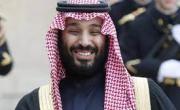Everybody Loves MBS at These Oil Prices
Saudis Bank Their Oil Windfall, Offering an Opportunity for Investors
By
Craig Mellow
June 3, 2022
Remember Jamal Khashoggi? Neither, apparently, does the global power elite these days. Crude oil pushing $120 a barrel has expunged concerns about the Saudi Arabian journalist dismembered in 2018, reportedly by minions of Crown Prince Mohammed bin Salman.
French President Emmanuel Macron and United Kingdom Prime Minister Boris Johnson have both trekked to Riyadh to cajole more production from MBS, as the de facto Saudi leader is known. President Joseph Biden may well follow suit this month, while attending a Gulf Cooperation Council summit in the Saudi capital. That would be thanks for Saudi-dominated cartel OPEC+ lifting output targets by 200,000 barrels daily at a June 2 meeting.
MBS isn’t just raking in political capital. The kingdom earned $1 billion a day on petroleum in the first quarter of 2022, yielding a $15 billion budget surplus.
So, what ails the Saudi stock market? The iShares MSCI Saudi ArabiaKSA –0.83% exchange-traded fund (ticker: KSA) has dropped 10% in the past month, leaving it flat since Russia upended oil markets by invading Ukraine on February 24.
A short-term check is the Saudi state’s uncharacteristic inclination to save the oil windfall, not pour it into Pharaonic projects like Neom, the $500 billion “blueprint for tomorrow” that MBS intends to build on the Red Sea. The finance ministry recently said that the surplus will be banked until the end of the year. “All that money they’re taking in may not make its way into people’s pockets,” says Michael Daoud Irsaneous, head of Middle East equity sales at Auerbach Grayson.
A longer-term check is the conviction that a touchy young dictator and his circle can’t build a progressive postpetroleum state, no matter how much money they throw at it. “Their imagination for doing things is enormous. Their irritation with anyone who says they’re overambitious is immense,” says Simon Henderson, director of Gulf and energy policy at the Washington Institute.
Saudi stocks may be worth buying on the current dip anyway, investors say. All of those petrodollars won’t sit quietly in the treasury forever, predicts Faisal Ghori, research director at Consilium Investment Management. “The money will have to get deployed somewhere, mostly domestically,” he says.
The government could also spread oil wealth by hiking public-sector salaries or trimming a value-added tax it tripled in 2020, Ghori adds. Any means are positive for the banks that dominate the Saudi stock index. These institutions also benefit from interest-free Shariah-compliant deposits, widening margins if inflation forces up interest rates. The Saudi index bellwethers are Al Rajhi Bank (RJHI.Saudi Arabia) and Saudi National Bank (SNB.Saudi Arabia).
Unlike the tenuous capital projects, social changes unleashed by the 36-year-old MBS are real and profound. Movies and concerts, banned by his fundamentalist forebears, have become commonplace in Saudi cities. Women are pouring into workplaces, and driving themselves there. Female labor-force participation jumped from 20% to 33% from 2019 to 2021, a Brookings Institution study found.
“The social changes are irreversible at this point,” says David Ottaway, a Middle East Fellow at the Wilson Center and author of a book on MBS.
The crown prince has “totally given up on ending Saudi’s addiction to oil,” Ottaway thinks. With oil’s current outlook, that may not be the worst thing. “Saudi and Abu Dhabi will continue to do well until things normalize again,” Auerbach Grayson’s Irsaneous says. “It’s a buy for us.”


